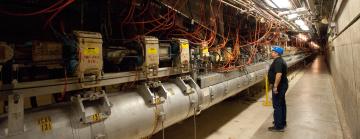Performance Optimization for Human-in-the-Loop Complex Control Systems
The Performance Optimization for Human-in-the-Loop Complex Control Systems project is not only focused on optimizing the performance of control systems in the Accelerator Control Room (ACR) at SLAC but also on understanding and improving the learning process in humans. By studying human behavior characteristics and modeling how individuals learn, this project aims to develop more effective and efficient training protocols for future operators.

One of the key goals of the project is to gain a deep understanding of the learning process and use that knowledge to design a training program that expedites the acquisition of expertise for new operators. By analyzing the decision-making processes and problem-solving approaches employed by experienced operators, the project team can identify the skills and strategies that contribute to their expertise. This qualitative research on human expertise in operating complex control systems provides valuable insights into the learning process.
In addition to qualitative studies, the project incorporates quantitative modeling techniques. The team focuses on the Free Electron Laser (FEL) operation as a representative example of the complex tasks performed in the ACR. The FEL operation involves maximizing beam brightness by adjusting multiple parameters, and experienced operators rely on intuition and experience to determine if brightness has been maximized. By analyzing the performance records of participants tuning the FEL, mathematical models of their solution processes will be developed.

These mathematical models provide a quantitative representation of the decision-making and problem-solving strategies employed by operators with different levels of expertise. By comparing the performance records of operators at various skill levels, the project team can identify variations in task performance and gain insights into the expertise exhibited by experienced operators. This analysis contributes to a better understanding of how expertise is acquired and developed over time.
The insights gained from this project can provide valuable knowledge about the learning process in humans. By studying the strategies and skills employed by experienced operators, the project team can identify the critical factors that contribute to expertise. This knowledge can then be used to design training programs that effectively cultivate these skills in new operators. The goal is to streamline the training process, reduce training time, and enhance overall system performance.
Overall, the Performance Optimization for Human-in-the-Loop Complex Control Systems project serves as a platform to investigate and explore the learning process in humans. By combining qualitative research, quantitative modeling, and the analysis of performance records, the project team aims to uncover the underlying mechanisms that drive expertise in operating complex control systems. The project's findings will not only contribute to optimizing the performance of control systems at SLAC but also provide valuable insights into how humans learn and acquire expertise in complex tasks.
Project lead: Wan-Lin Hu
Period of Performance | September 2022-September 2024 |
Funding agencies | LDRD |

